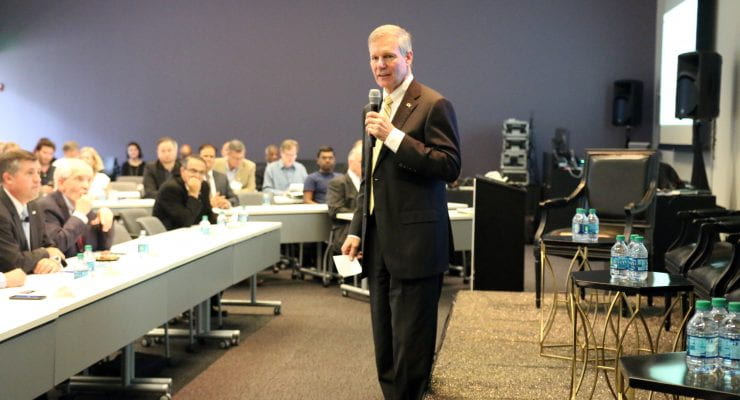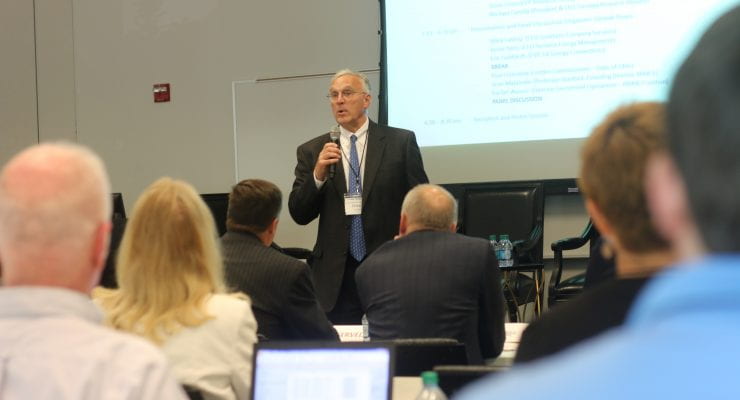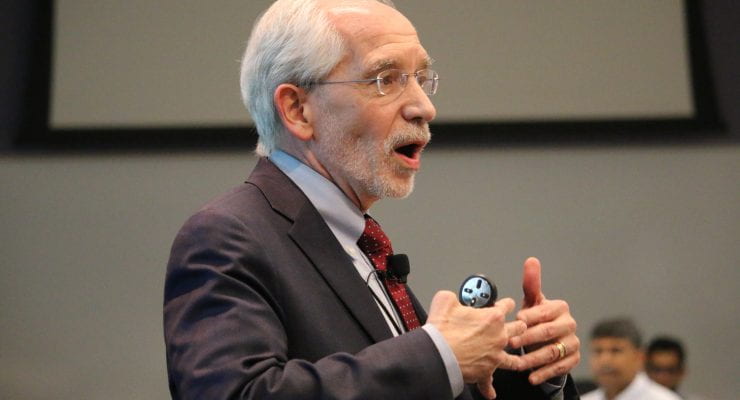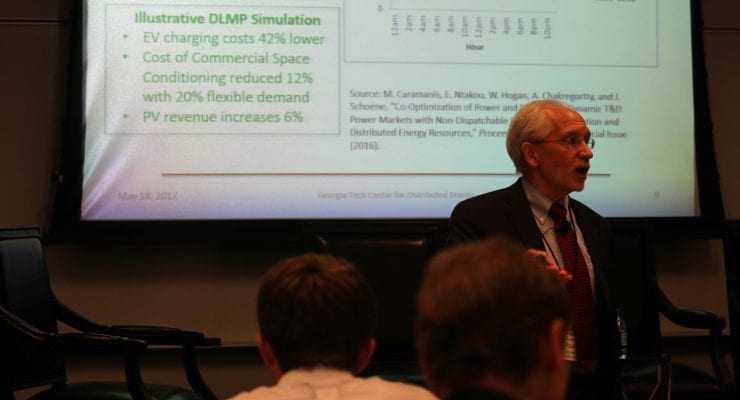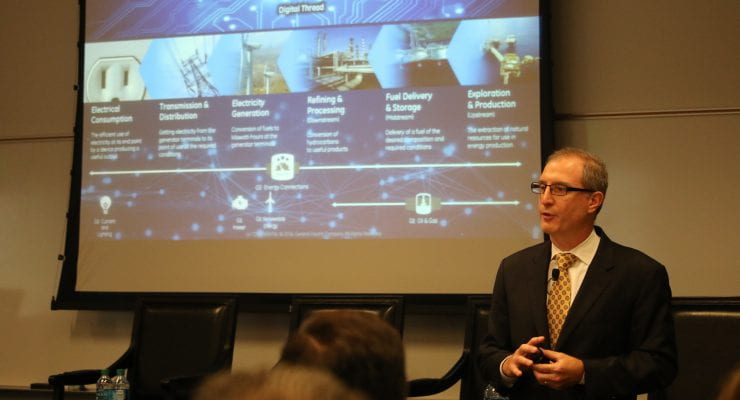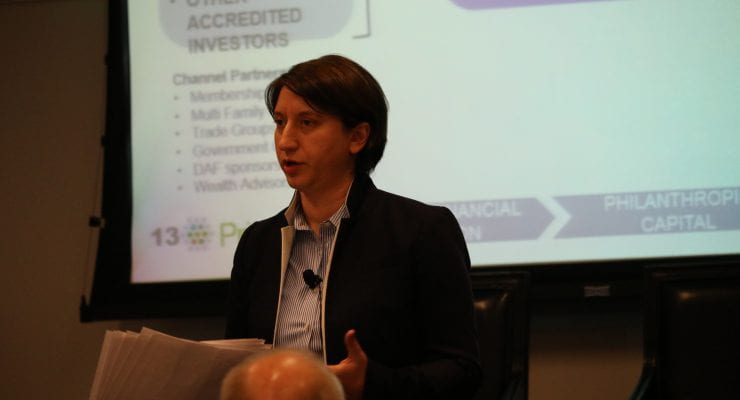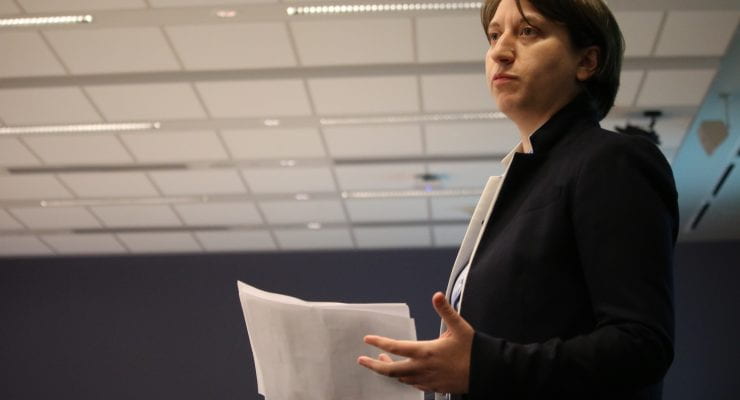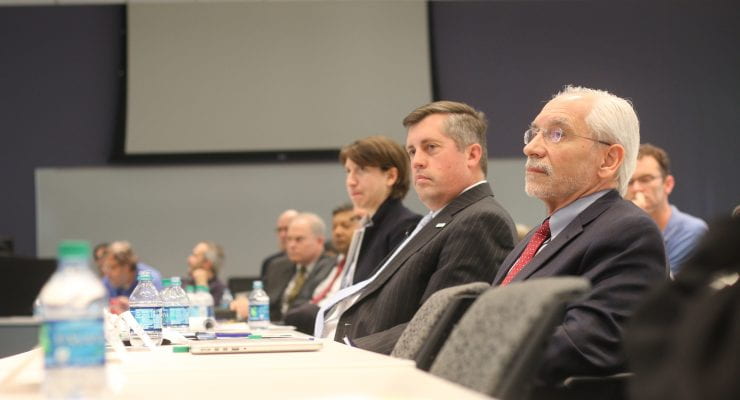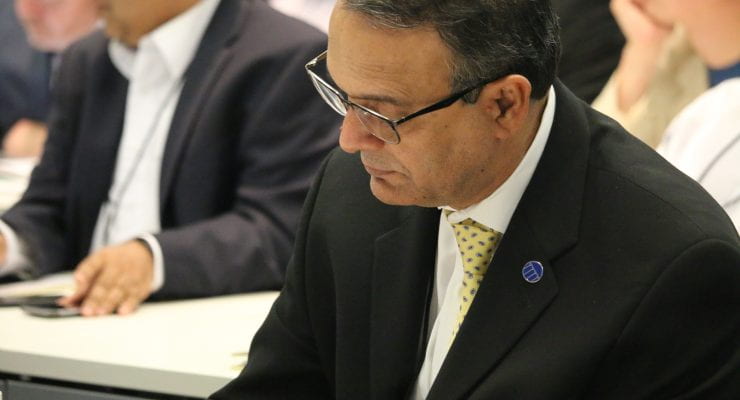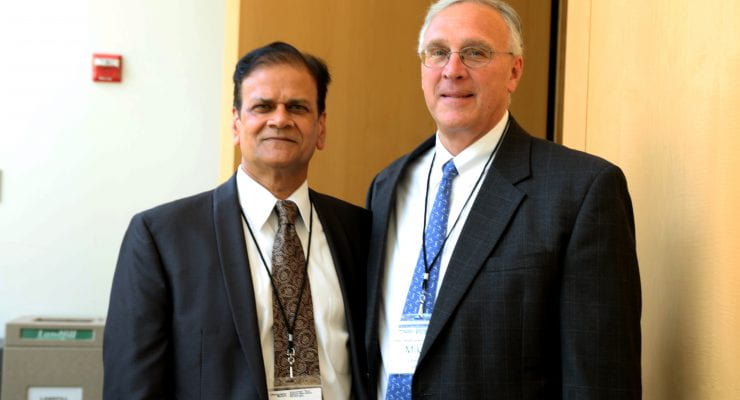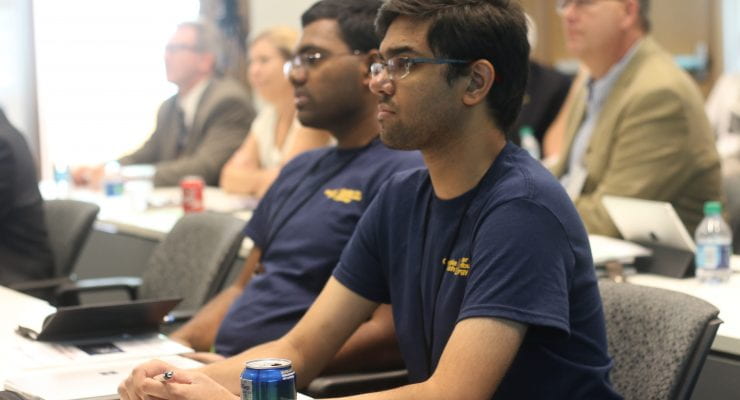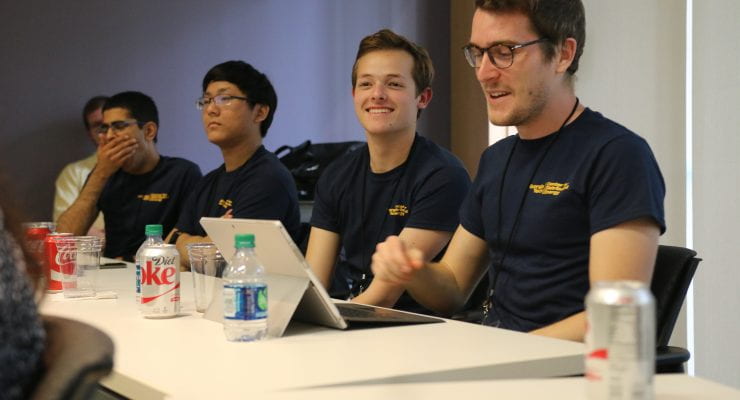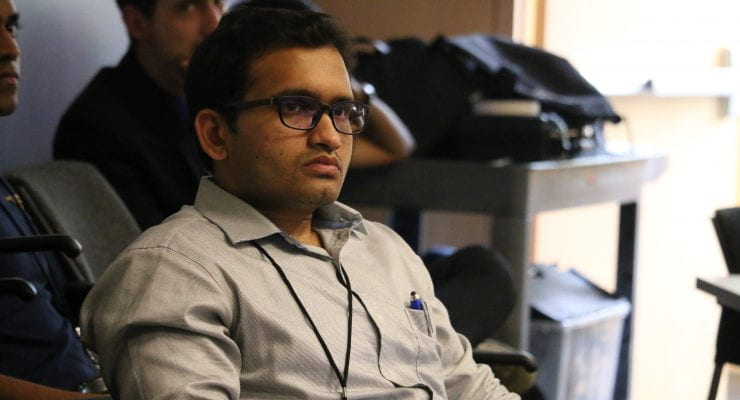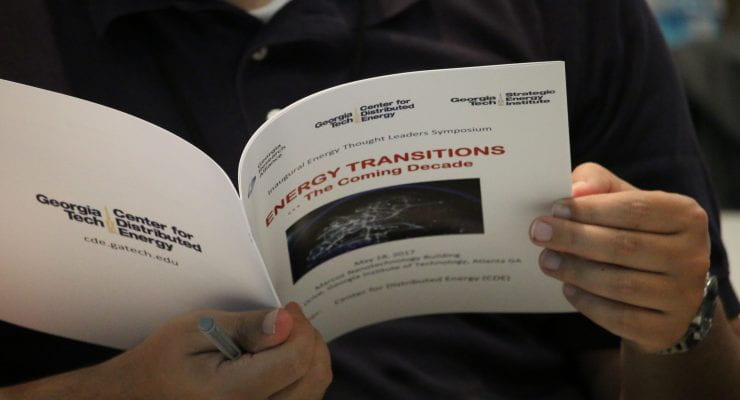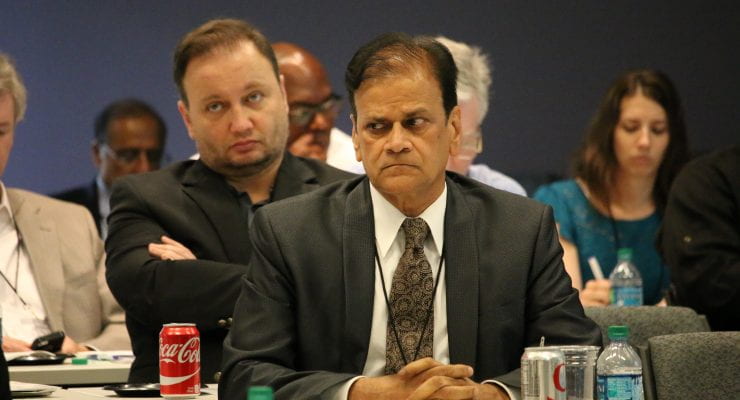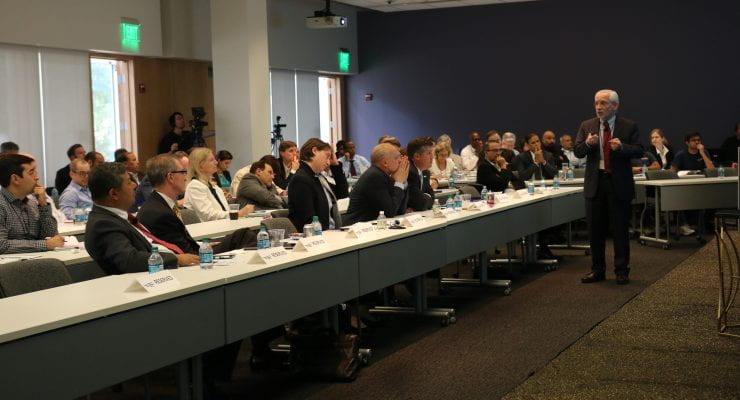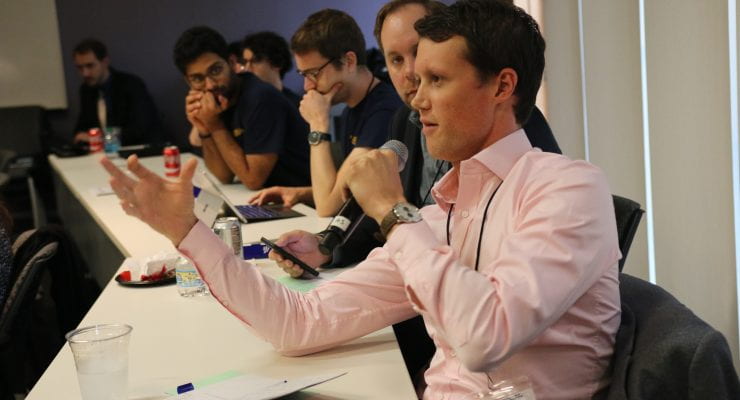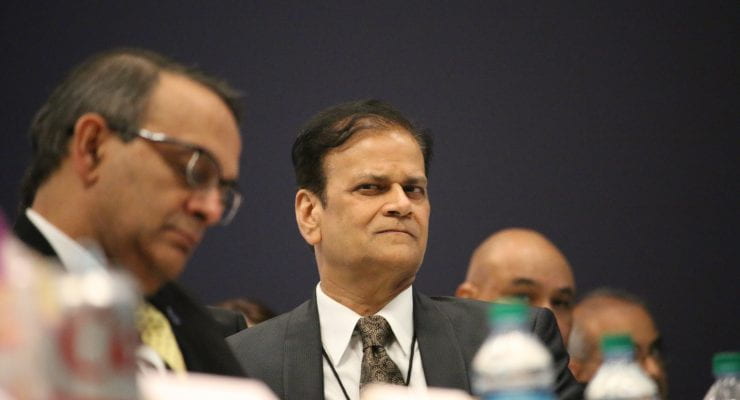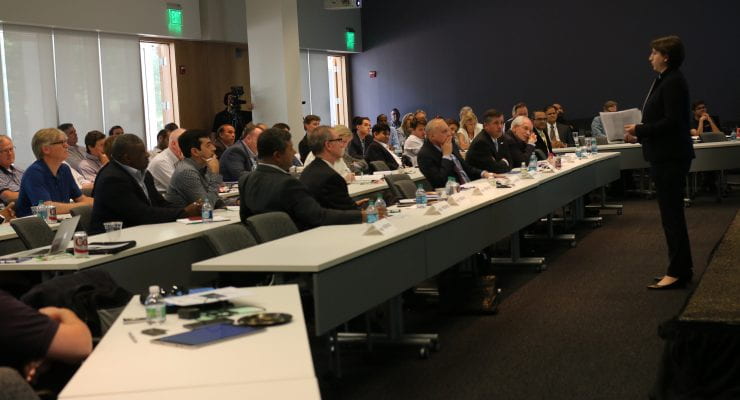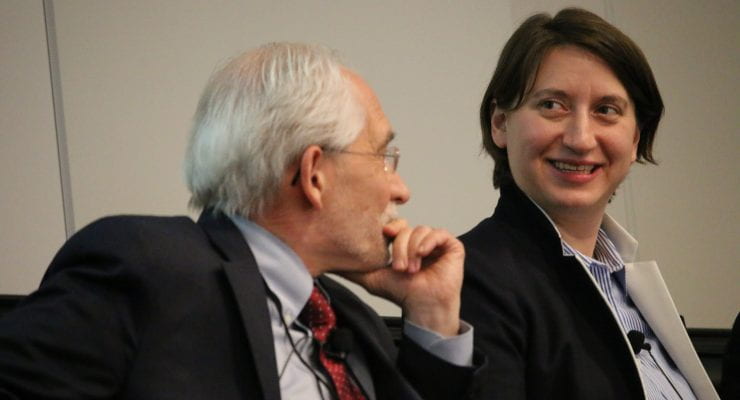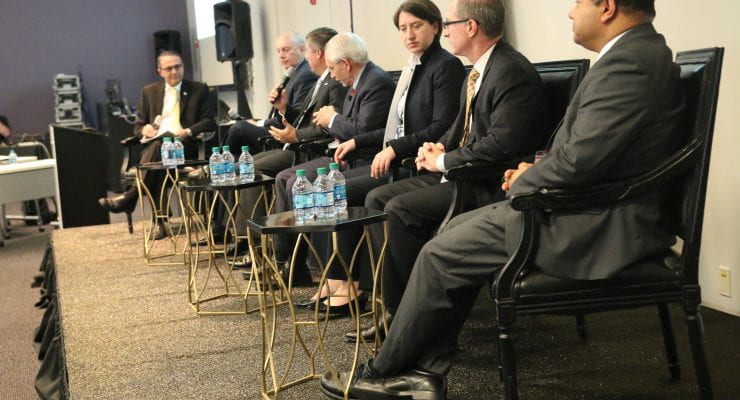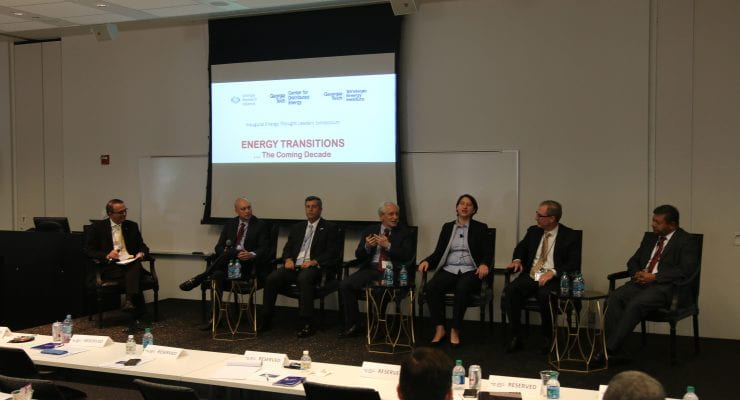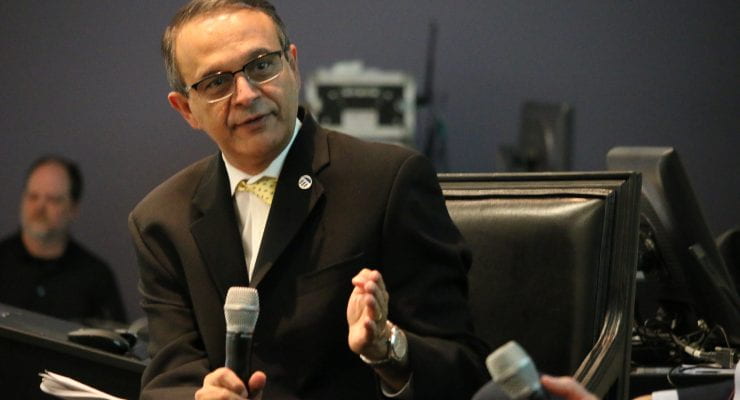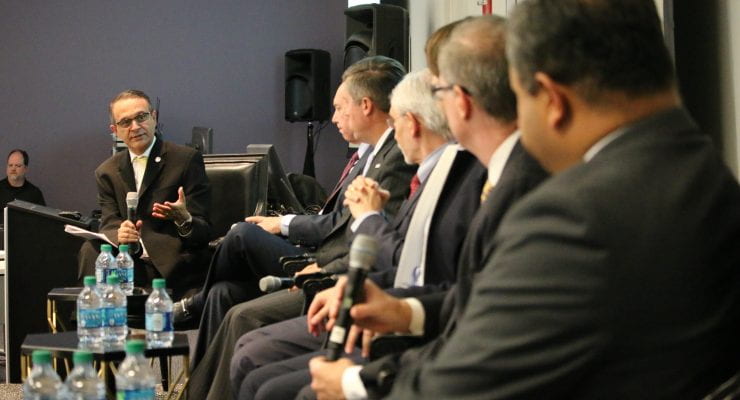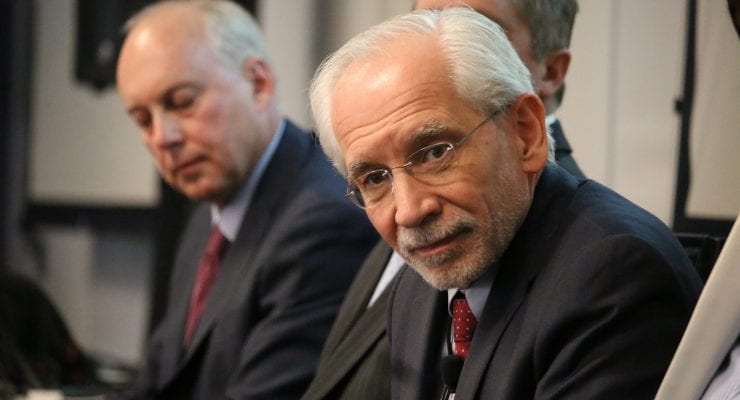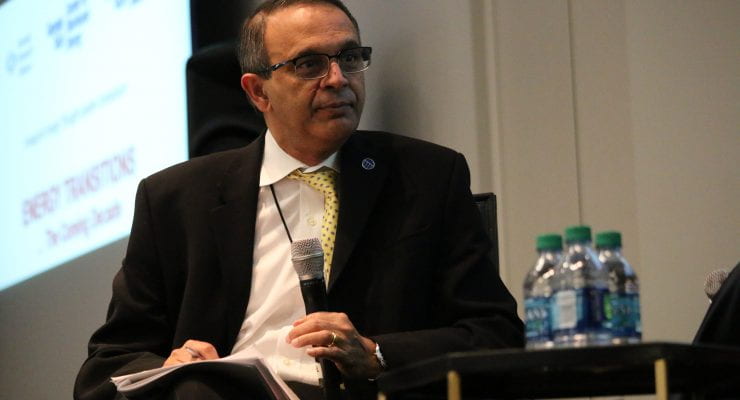Date: May 18th, 2017
Location: Marcus Nanotechnology Building
The Energy Thought Leaders Symposium is being hosted by the Center for Distributed Energy at the Georgia Institute of Technology as an annual event that brings together global thought-leaders and provides an interactive forum to look at the issues, challenges, disruptions and opportunities that the energy sector needs to manage over the next decade, with a particular focus on electrical energy generation, delivery and utilization.
The normally stable electricity energy infrastructure, a key driver for global economic growth over the last century, is being buffeted by winds of change. Rapid growth of exponential technologies with 20-30% annual learning rates (including solar, LEDs, IoT, communications, battery storage and the continued electrification of transportation) makes it challenging to predict, plan, invest or execute on multi-decade timelines that have been typical for the energy industry. Long adoption cycles that have been typical in regulated energy industries, are the antithesis of technologies that are innovative and disruptive, cause poor ROI for investors, and make early stage investments in new energy technologies very challenging. This is a complex problem, and technology, economics, policy and politics all intersect to create tremendous uncertainty. This creates major challenges – and opportunities.
Given the many conflicting needs and requirements, a quest for solutions inevitably leads to many more questions, some of which will be addressed by the panel. These questions include:
- While an end goal of an environmentally sustainable energy infrastructure is desirable, what is the roadmap that will get us there, and is it economically viable?
- Looking holistically at the issues, can one define and prioritize key technologies, policies (regulations and incentives), business models and financing models that will enable this rapid transformation?
- Long gestation periods and long adoption cycles make investment in early stage energy technologies very challenging, limiting the impact of innovative solutions at the very time we need them most – are there new innovation pathways and funding models feasible?
- Given the investments that have already been made in developed countries, will these new developments first take root in the emerging markets – and if so what is the economic model?
- 3 billion people live off-grid or in extreme energy poverty and will join the modern productive world over the next two decades creating new opportunities for innovation – if so, what is the new infrastructure, what will it cost, and what will its impact be on global emissions and energy use?
Guest Speakers:
[expand title=”G. P. Bud Peterson (President, Georgia Tech)”]
G. P. “Bud” Peterson was appointed as the 11th president of Georgia Tech on April 1, 2009. Under his leadership, Georgia Tech has developed and begun the implementation of a 25-year strategic plan, exceeded the $1.5 billion goal for Campaign Georgia Tech by 20 percent, grown innovative collaborations and strategic partnerships, expanded the campus infrastructure, and increased national and global visibility. Notably in that time, applications have tripled and enrollment has increased by 23 percent.
Throughout his career, Peterson has played an active role in helping to establish the national education and research agendas, serving on numerous industry, government, and academic task forces and committees. A distinguished scientist, he was appointed in 2008 by President George W. Bush, and again in 2014 by President Barack Obama, to serve as a member of the National Science Board, which oversees the NSF and advises the President and Congress on national policy related to science and engineering research and education.
He has served as a member of a number of congressional task forces, research councils, and advisory boards, including the Office of Naval Research (ONR), the National Aeronautics and Space Administration (NASA), the Department of Energy (DOE), the National Research Council (NRC), and the National Academy of Engineering (NAE). In addition, he has served as a member of the Board of Directors and vice president for education for the American Institute of Aeronautics and Astronautics (AIAA) and the National Advisory Council on Innovation and Entrepreneurship (NACIE). In August 2016, he became chair of the NCAA Board of Governors, the highest governing body of the NCAA.
A Fellow of both the American Society of Mechanical Engineers and the American Institute of Aeronautics and Astronautics, Peterson is the author or co-author of 16 books or book chapters, 210 refereed journal articles, more than 170 conference publications, and holds 13 patents with one pending. He is a member of several professional organizations and the recipient of numerous national and international honors and awards for both teaching and research.
Peterson earned a bachelor’s degree in mechanical engineering, a second bachelor’s degree in mathematics, and a master’s degree in engineering, all from Kansas State University. He earned a PhD in mechanical engineering from Texas A&M University. He and his wife, Val, have four adult children, two of whom are Georgia Tech alumni.
A top ten public research university in the U.S., Georgia Tech has outstanding programs in business, computing, design, engineering, liberal arts, and the sciences. With more than 25,000 students and 150,000 living alumni who work in business, industry, and government throughout the world, Georgia Tech has become internationally recognized for the quality of its educational and research programs. During the past two decades, Georgia Tech has grown into one of the world’s most globalized technological universities, with collaborations in more than 100 countries.
[/expand]
[expand title=”Steve Cross (EVP Research, Georgia Tech)”]
Dr. Stephen E. Cross serves as Georgia Tech’s Executive Vice President for Research and he holds a faculty position in the H. Milton Stewart School of Industrial and Systems Engineering. He serves on the executive committee of the Government-University-Industry Research Roundtable, an organization sponsored by the National Academies, and on the Administrative Committee of the Institute of Electrical and Electronic Engineers (IEEE) Technology and Engineering Management Society (TEMS). He has published widely on leadership, innovation, culture change, systems and software engineering, and technology transition. Dr. Cross is an IEEE Life Fellow and a former Editor-in-Chief of IEEE Intelligent Systems.
[/expand]
[expand title=”Michael Cassidy (President & CEO, Georgia Research Alliance)”]
Michael Cassidy is President and CEO of the Georgia Research Alliance, a non-profit organization that expands research and commercialization capacity in Georgia’s universities to launch new companies, create high-value jobs and transform lives. Key initiatives of the Alliance include recruitment of top scientific talent, seeding signature centers of excellence, and commercialization of university research discoveries. He is a co-founder of the GRA Venture Fund, LLC, a private investment fund created to finance promising companies that emerge through the Alliance’s commercialization programs. Cassidy serves on the Board of Directors of the State Science and Technology Institute, the Health Care Ethics Consortium, Georgia Advanced Technology Ventures, the Global Center for Medical Innovation, Atlanta Emerging Markets Inc., the Georgia Chamber of Commerce, and the Board of Governors of the Lake Lanier Sailing Club. Before joining the Alliance in 1993, Cassidy managed the Advanced Technology Development Center (ATDC), Georgia’s technology incubator. Prior to that he worked for the IBM Corporation where he held various staff and management assignments. Cassidy holds a Master’s degree in Technology and Science Policy from the Georgia Institute of Technology and a BBA degree in Marketing from Georgia State University.
[/expand]
[expand title=”Deepak Divan (Professor – Georgia Tech, Director – CDE)”]
Dr. Deepak Divan is Professor, John E Pippin Chair, GRA Eminent Scholar and Director of the Center for Distributed Energy at the Georgia Institute of Technology in Atlanta, GA. His field of research is in the areas of power electronics, power systems, smart grids and distributed control of power systems. He works closely with utilities, industry and is actively involved in research, teaching, entrepreneurship and starting new ventures. Dr. Divan is an elected Member of the US National Academy of Engineers, a Fellow of the IEEE, past President of the IEEE Power Electronics Society, and is a recipient of the IEEE William E Newell Field Medal. He has 40 years of academic and industrial experience, 65 issued and pending patents, and over 400 refereed publications. He has founded or seeded several new ventures including Soft Switching Technologies, Innovolt, Varentec and Smart Wires, which together have raised >$150M in venture funding. He received his B. Tech from IIT Kanpur, and his MS and PhD degrees from the University of Calgary, Canada.
[/expand]
[expand title=”Mark Lantrip (CEO, Southern Company Services)”]
Mark Lantrip serves as president and CEO of Southern Company Services, overseeing the company’s information technology, supply chain management and marketing, innovation and planning. He is also responsible for PowerSecure, Southern Company’s distributed infrastructure development company; SouthernLINC Wireless, the company’s wireless telecommunications provider; and Southern Telecom, the company’s wholesale ber optic network provider.
Prior to assuming his current role in February 2014, Lantrip served as executive vice president of finance and treasurer of Southern Company Services and treasurer of Southern Company with responsibility for financial planning and analysis, enterprise risk management, trust finance, capital markets and treasury.
Lantrip joined Southern Company in 1981 as an analyst in the corporate planning department of Gulf Power and progressed through various areas of responsibility at both Georgia Power and Southern Company Services.
In 1994, he was named manager of financial planning and analysis at Southern Company Services and was promoted in 1999 to director of financial planning and analysis. In that role, he was responsible for delivering Southern Company’s financial plan and stewarding Southern Company’s financial policy, providing leadership and financial input to executive management on strategy, goals and other financial decisions.
Lantrip was promoted to vice president of financial planning and risk management in 2004, consolidating responsibility for the company’s financial planning and enterprise risk management activities. In 2007, he became vice president of finance and treasurer of Southern Company Services and treasurer of Southern Company. He was promoted to senior vice president later that year and executive vice president in 2010.
Lantrip holds a B.A. from Southern Illinois University and an M.B.A. from the University of West Florida. He and his wife, Lisa, have two children and three grandchildren.
[/expand]
[expand title=”Kevin Yates (President of the Siemens Energy Management Division)”]
Kevin Yates is the President of the Energy Management Division for Siemens in the U.S. and Canada. In this role, he leads operational and commercial activities for Siemens’ complete power distribution portfolio — from utility transmission through to end-user distributions.
His portfolio is comprised of six business units: Transmission Solutions, High Voltage Products, Digital Grid, Transformers, Medium Voltage & Systems, and Low Voltage & Products.
The Energy Management Division is one of the leading global suppliers of products, systems, solutions, and services for the economical, reliable, and intelligent transmission and distribution of electrical power. The portfolio includes products and systems for the low-voltage and distribution power grid level, smart grid solutions and high-voltage transmission systems.
Yates has held a wide variety of high-level management positions within Siemens, both at the manufacturing and operations level, as well as executive management positions. He began his career at Siemens as a manufacturing
manager in the Residential Products Division with responsibility for overall manufacturing operations and cost management. Yates also served as Factory Manager for two years at the Siemens manufacturing location in Spartanburg, SC. He has since held executive management positions of increasing responsibility including Vice President of the Residential Products Division, Vice President for the Low Voltage Distribution Business Unit and President of the Low & Medium Voltage Power Distribution Division.He has a Bachelor of Industrial Engineering from Clemson University, and Master of Engineering Management, University of Tennessee.
Kevin’s also serves as a Board Member of the Electrical Safety Foundation International, an organization dedicated exclusively promoting electrical safety in the home, school and work place. Yates recently began serving as the co-chair of the Metro Atlanta Chamber Infrastructure Council and is also on the Chamber’s Board of Advisors.
[/expand]
[expand title=”Eric Gebhardt (VP, GE Energy Connections, Houston TX)”]
Eric Gebhardt is Vice President of Product Management at GE Energy Connections. In this role, Eric provides the overall strategic direction for the product portfolio across Energy Connections, bringing together commercial and operating functions to ensure alignment for successful product development as well as operational and commercial launches. He is an Officer of the General Electric Company and has been engaged in the Energy Industry for his entire 25+ year career with GE. Eric is a graduate of the Georgia Institute of Technology with a Bachelor of Science Degree in Aerospace Engineering. He is also a frequent speaker at industry, government and academic forums and holds 9 patents.
[/expand]
[expand title=”Paul Centolella (Former Commissioner – State of Ohio, President – Paul Centolella & Associates)”]
Paul Centolella has more than 35 years of experience in energy economics, law, and regulation. His work has contributed to the development of environmental and electric power markets, grid modernization, and the evolution of utility business and regulatory models. Mr. Centolella advises clients and provides expert testimony on utility regulation and pricing, utility business and regulatory models, power markets, energy innovation, and applications of smart and clean energy technology. He is a former Commissioner on the Public Utilities Commission of Ohio. He currently serves on the U.S. Secretary of Energy’s Electricity Advisory Committee, where he Chairs the Smart Grid Subcommittee, and on the National Institute of Standards and Technology’s Smart Grid Advisory Committee. He was a member of a National Academy of Sciences committee on market adoption of advanced energy efficiency and clean energy technologies, which published its report, The Power of Change: Innovation for Development and Deployment of Increasingly Clean Electric Power Technologies, in September 2016, and the Advisory Committee for the MIT Utility of the Future study, released in December 2016. He also has served on the Electric Power Research Institute’s Advisory Council, the Governing Board and Board of Directors for the Smart Grid Interoperability Panel (SGIP), and the Board of the Organization of PJM States.
[/expand]
[expand title=”Arun Majumdar (Professor Stanford, Founding Director ARPA-E)”]
Dr. Arun Majumdar is the Jay Precourt Professor at Stanford University, a faculty member of the Department of Mechanical Engineering and co-director of the Precourt Institute for Energy, which integrates and coordinates research and education activities across all seven Schools and the Hoover Institution at Stanford.
Dr. Majumdar’s research in the past has involved the science and engineering of nanoscale materials and devices, especially in the areas of energy conversion, transport and storage as well as biomolecular analysis. His current research focuses on electrochemical storage, power generation and refrigeration; storing carbon-free energy in renewable fuels; and a new effort to re-engineer the electricity grid using modern sensing, computing and control as well as data science.
In October 2009, Dr. Majumdar was nominated by President Obama and confirmed by the Senate to become the Founding Director of the Advanced Research Projects Agency – Energy (ARPA-E), where he served till June 2012 and helped ARPA-E become a model of excellence for the government with bipartisan support from Congress and other stakeholders. Between March 2011 and June 2012, he also served as the Acting Under Secretary of Energy, enabling the portfolio that reported to him: Office of Energy Efficiency and Renewable Energy, Office of Electricity Delivery and Reliability, Office of Nuclear Energy and the Office of Fossil Energy, as well as multiple cross-cutting efforts (e.g. Sunshot, Grid Tech Team, etc) that he initiated.
After leaving Washington, DC and before joining Stanford, Dr. Majumdar was the Vice President for Energy at Google, where he created several energy technology initiatives, especially at the intersection of data, computing and electricity grid, and advised the company on its broader energy strategy.
Dr. Majumdar is a member of the National Academy of Engineering and the American Academy of Arts and Sciences. He served as the Vice Chairman of the Advisory Board to US Secretary of Energy, Ernest Moniz, and was also a Science Envoy for the US Department of State with focus on energy and technology innovation in the Baltics and Poland. He is a member of the Councils of the National Academy of Engineering and the Electric Power Research Institute. He is a member of the International Advisory Panel for Energy of the Singapore Ministry of Trade and Industry and the US delegation for the US-India Track II dialogue on climate change and energy. He also serves on the advisory board of various new energy ventures, such as Envision Energy and Breakthrough Energy Ventures.
Dr. Majumdar received his bachelor’s degree in Mechanical Engineering at the Indian Institute of Technology, Bombay in 1985 and his Ph.D. from the University of California, Berkeley in 1989.
[/expand]
[expand title=”Rachel Wasser (Director Investment Operations – PRIME Coalition)”]
Rachel M. Wasser is the Director of Investment Operations at PRIME Coalition, a public charity that empowers philanthropists to place charitable capital into market-based solutions to climate change. PRIME works closely with foundation grantmakers, DAFs, corporate donors, and individuals/family offices to facilitate investments into early-stage cleantech companies that are optimized for climate impact, attractiveness to commercial follow-on investment, and fitness for charitable capital.
Rachel is experienced in launching, growing, and operating high-impact organizations driving innovative solutions to environmental and social challenges. She began her career in China, where she spent nearly a decade, first working on the deployment of clean technologies and environmental policy. She then launched one of China’s top non-profits, Teach For China, and grew it into a nationally recognized (US and China) organization reaching 30,000+ children. Through her experience founding Teach For China, Rachel had a front row seat to the rapid evolution of the Chinese philanthropic sector, and came to believe strongly in philanthropy’s catalytic potential, as well as the importance of market-based models for impact. Since returning to the US, Rachel is focused on bringing much-needed capital to market-based climate change solutions. At PRIME, she oversees relationships with entrepreneurs and the ecosystem organizations that support them.
Rachel holds a B.A. in Environmental Studies from Yale University. Based on her work, she has been recognized as a Featured Changemaker by the Hong Kong Make a Difference Forum, and as a Social Innovator by the Foundation for Youth Social Entrepreneurship. Rachel speaks Mandarin and has been published in English and Chinese on issues of sustainability.
[/expand]
Sponsors:
[expand title=”Georgia Tech Center for Distributed Energy”]
The Center for Distributed Energy (CDE) has been established at Georgia Tech with financial support from the Georgia Research Alliance and Georgia Tech to do advanced research and to develop technologies and holistic solutions that can transform electricity delivery and utilization. Research areas include power conversion, industrial applications, energy conservation, distributed energy resources, distributed control of the grid, security and communications in energy, as well as microgrids, dc nanogrids and energy access for emerging markets. CDE partners include utilities, industry, manufacturers, research organizations, start-ups, VCs and other academic institutions with interests in aligned areas. In addition to doing traditional forward-looking cutting-edge academic research, CDE is uniquely focused on accelerating and de-risking technologies so that they can see faster adoption and higher impact.CDE uses an interdisciplinary approach, including core power technologies, controls, communications, cyber-security, data management, analytics, economics and policies to find pragmatic solutions that can potentially be commercialized. Deep interaction with industry helps understand their needs and helps develop solutions that can be effectively used. The CDE Industry Partnership Program (CDE-IPP) has been established to enable and facilitate this synergistic collaboration. For becoming a Member of the CDE-IPP, please contact Dr. Deepak Divan, Director CDE at ddivan@gatech.edu.
[/expand]
[expand title = “Georgia Research Alliance”]
The Georgia Research Alliance (GRA) is an independent nonprofit organization partnered with the University System of Georgia and Georgia Tech that aims to help grow university research in Georgia by expanding its capacity. Academic, government, and industry leaders represent the GRA’s board, with both public and private funding. GRA recruits world-class scientists to Georgia Universities, funds cutting-edge technology for university research labs, aids in commercializing discoveries and inventions made in universities, and strengthens the bond between universities and industries. GRA’s efforts have helped science and technology breakthroughs to continuously develop in Georgia’s universities and maintained Georgia’s status as a hub of research and innovation.
[/expand]
[expand title=”Georgia Tech Strategic Energy Institute”]
The Georgia Tech Strategic Energy Institute (SEI) integrates energy activities across the nation’s largest technology university – from generation to distribution to use. Whether it’s commercializing a technology to address a specific challenge or designing a roadmap for focusing resources, we understand the systems, technologies and context of the ever-evolving nature of energy production and use. The Institute serves as a hub for promoting greater understanding and better solutions to our most complex energy and environmental challenges. These include concerns such as the efficiency of fuel extraction and production; the disposal or storage of energy waste byproducts; and the environmental impacts caused by use of fossil fuels, such as carbon dioxide and other pollutants.
[/expand]



